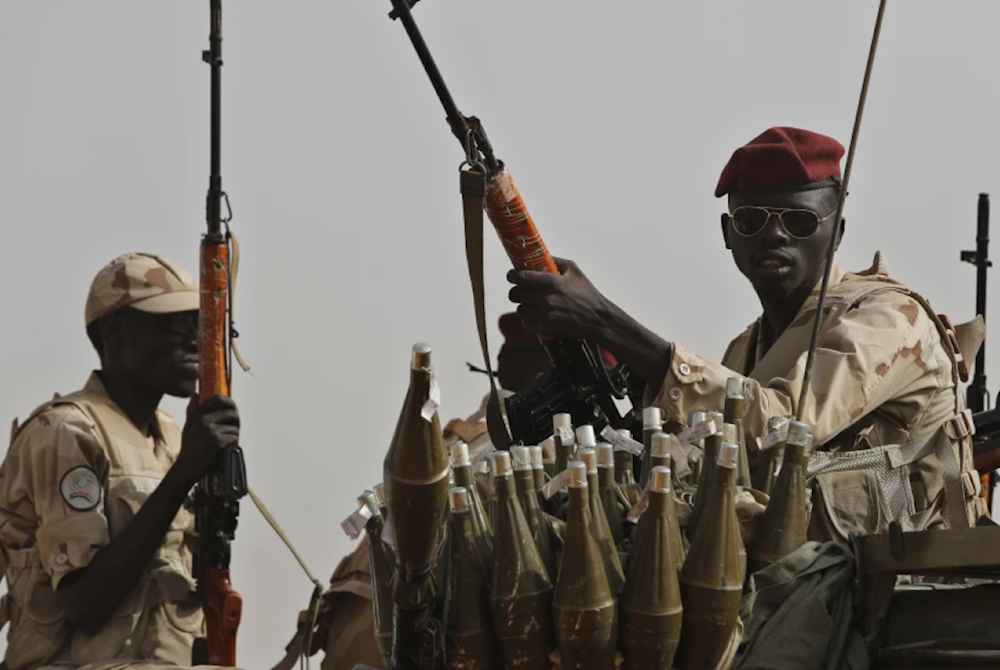Sudan's army announced killing RSF major commander
The RSF has been besieging el-Fasher, a metropolis of 1.8 million people, for weeks, and top United Nations officials have warned that the escalating conflict might spark widespread intercommunal bloodshed.
-

Soldiers from the Rapid Support Forces unit secure the area where General Mohammed Hamdan Dagalo attends a military-backed tribe's rally in the east Nile province on June 22, 2019. (AP)
Sudan's army stated on Friday that it had killed Ali Yagoub Gibril, a senior leader of the paramilitary Rapid Support Forces (RSF) who was subject to US sanctions, following a fight in the besieged North Darfur city of el-Fasher.
The RSF has yet to make a statement regarding the matter. Gibril was a top RSF leader in el-Fasher, Sudan's last major city not under the authority of the paramilitary organization.
The Sudanese Armed Forces (SAF) announced in a statement that Yacoub was killed after an RSF offensive was foiled early on Friday by its troops.
The RSF has been besieging el-Fasher, a metropolis of 1.8 million people, for weeks, and top United Nations officials have warned that the escalating conflict might spark widespread intercommunal bloodshed.
The SAF announced in late May that the RSF withdrew from the eastern borders of El-Fasher, the capital of North Darfur, western Sudan.
The Sudanese army published a video accompanied by a statement stating that "the armed forces and joint forces crushed the crowds of the terrorist RSF militia, inflicting great losses on them in terms of personnel, equipment, weapons, and vehicles."
The SAF "expelled the enemy outside the eastern borders of the city of El-Fasher and took control of a number of their positions from which they were shelling camps, citizens' homes, and health institutions."
The city of el-Fasher has witnessed a deterioration in humanitarian conditions, in conjunction with the worsening fighting between the Sudanese army and the RSF, especially since the city is home to more than one and a half million residents and displaced people, all amid fears of a severe shortage of food and health services.
Darfur city's last hospital forced to shut down amid intense fighting
On Monday, Doctors Without Borders reported that the sole functioning hospital in El-Fasher ceased operations following an assault by paramilitary forces attempting to capture the critical Darfur city, as reported by Doctors Without Borders.
The conflict has persisted for over a year between the conventional military forces led by army chief Abdel Fattah al-Burhan and the paramilitary Rapid Support Forces, once commanded by his former deputy, Mohammed Hamdan Dagalo.
El-Fasher, situated in North Darfur, stands as the sole state capital in the expansive western region not under the control of the Rapid Support Forces (RSF). It serves as a pivotal humanitarian center for a region teetering on the verge of famine.
"On Saturday, MSF and the Ministry of Health suspended all activities in South Hospital, El-Fasher, North Darfur, after RSF soldiers stormed the facility, opened fire, and looted it, including stealing an MSF ambulance," said the NGO in a statement posted late Sunday on X.
Human Rights Watch (HRW) previously urged the United Nations and African Union to swiftly implement an arms embargo on Sudan and deploy a mission with a strong police force to Darfur to safeguard civilians.
According to a report released by HRW in early May, sanctions are sought against those deemed accountable for extensive war crimes, including West Darfur RSF commander Abdel Rahman Joma’a Barakallah, and the commander of the RSF, Mohamed Hamdan Dagalo, and his brother Abdel Raheem.
The United Nations children's agency UNICEF issued an urgent appeal for action earlier in May to protect children amid escalating violence in Sudan's North Darfur region.
Expressing profound concern, UNICEF Executive Director Catherine Russell highlighted the intensifying violence in North Darfur, particularly in and around el-Fasher city.
Russell emphasized in a statement the critical need for a ceasefire, stressing the urgency of halting the conflict between the Sudanese Armed Forces and the paramilitary Rapid Support Forces (RSF).
The UNICEF official highlighted that the city shelters at least 500,000 people displaced by the fighting, warning that the well-being of approximately 750,000 children is in danger due to the current circumstances.

 4 Min Read
4 Min Read










